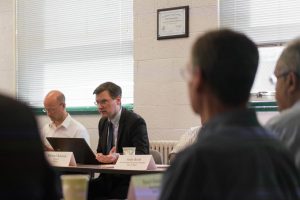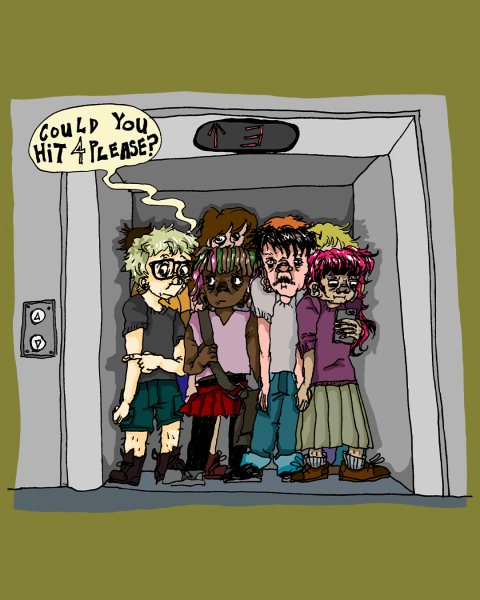Salary increase sparks disagreement among App State professors
March 1, 2022
Recent raises have some professors questioning their salary while others disagree on where their salaries come from.
Chancellor Sheri Everts announced a 2.5% across the board salary increase Jan. 28 for the 2021-22 fiscal year. The raise was effective Jan. 1.
A letter sent to faculty Feb. 8, stated there will be a merit increase based on teaching, research and service. In addition to merit increases, a 2.5% legislative increase is expected in the Feb. 28 paycheck, effective Feb. 21, wrote Kathryn Montalbano, communication professor.
“I’ve never gotten merit increases,” Montalbano said. “I’ve only been here since 2020 and have worked for four years at two other institutions and have never received increases like this. So, I was very pleased.”
Others, such as history professor Jeffrey Bortz say professor salaries are too low. Bortz criticized the App State’s salary practices in a recent opinion article in The Charlotte Observer

(Molly Fennessy)
“Most of our full professors do not earn twice the Domino’s wage, even those with years of award-winning teaching and published research,” Bortz wrote. “In fact, most of my colleagues earn significantly less. These low salaries come on the heels of a decade-long faculty salary collapse at ASU.”
Due to inflation rates increasing, professor salaries have dropped 4.5% in real wages, Bortz wrote in his article.
Inflation rates reached 7% in December, according to the U.S. Bureau of Labor Statistics. In January, App State provided a 2.5% state-mandated annual pay raise.
“In the History Department where I work, five full-time faculty earn less — some substantially less — than a full-time pizza delivery person earning $47,480. Most of our full professors do not earn twice the Domino’s wage,” Bortz wrote.
The lowest salary in the Department of History was earned by a lecturer who makes $32,125 annually, according to the UNC Salary Information Database.
The starting wage for Domino’s workers is $16-$32 an hour including tips. Therefore, a full-time Domino’s employee makes approximately $33,280-$47,480 a year, according to Domino’s Indeed page.
Bortz expressed concerns about possible consequences because of the decrease in wages for faculty. He said the issue was connected to the quality of education at App State, as well as overall morale among faculty members.
“Most people who teach enjoy teaching and work at it the best they can, but when they feel that they’re not being fairly compensated, or they feel that real compensation is declining, it’s very demoralizing,” Bortz said. “I don’t see how it could not impact everything.”
Bortz said Everts’ appointment as chancellor is a possible cause for the decrease in real wages among faculty since 2014.
Faculty across the board have lost $21,112 in annual purchasing power since 2009. Associate professors have lost $33,540 while full professors have lost $38,241, according to Appalachian’s Center for Economic Research and Policy Analysis.
The faculty senate voted no confidence in the chancellor Aug. 17, 2020. The vote was two to one in favor of no confidence, according to faculty senate reports. The lack of faith in Everts was largely related to the decline in faculty salaries but also concerns that the chancellor has failed to prioritize education, advocate for university employees and involve faculty in important decision-making, according to the reports.
In an analysis of 10-year tenure track faculty salary trends by the Center for Economic Research and Policy Analysis, the average App State faculty member salary increased $7,337 between 2014 and 2018.
Anna Oakes, App State media relations specialist, wrote in an email that Everts has prioritized faculty and staff salaries since she was instated as chancellor.
The Spring 2022 Faculty and Staff Meeting Feb. 4 addressed the new budget and raises.
“This budget reflects months upon months of advocacy for App State from members of the UNC System Board of Governors, our Board of Trustees, my leadership team and me. It also reflects their support and respect for your work, which we routinely showcase,” Everts said in her remarks from the Faculty and Staff Meeting.
Everts has been a “consistent advocate” for faculty and staff salary increases, Oakes wrote.
Timothy Smith, anthropology professor and former department chair, said faculty are not going to be paid as much as institutions with a higher student population or with larger research facilities because more money must be allocated to larger institutions based on student body and research.
“The salaries at App State are better than they were 10 years ago. I understand that there are limitations and restrictions placed upon the chancellor that, in itself, is based upon limitations and restrictions placed upon the UNC System office by the budget that we are given by the state,” Smith said.
However, Bortz said the administration should focus their energy on redistributing funds in a way that prioritizes faculty salaries.
“The core function of the university is the faculty. The faculty is the university. The university is the teaching, and the research and the faculty are doing that,” Bortz said. “So, the entire budget process should be oriented to that. It should be to maximize teaching and research and minimize all the rest.”
Smith said there is a set of criteria used to determine the funding allocated to universities within the UNC System, as well as the salary increases granted to faculty members.
The North Carolina State government provides each university in the state a set amount of money based on factors such as student enrollment, undergraduate research and overall academic performance.
Universities provide pay increases to faculty based on a multidisciplinary salary report, a system that draws from various categories to determine if a faculty member is eligible for a pay increase. The categories can include the faculty member’s time with the university, and their performance in areas such as teaching, service and research, according to the UNC Policy Manual.
“I’m not sure how many faculty truly understand our funding model. But they should understand that we have an advocate for us in the chancellor, who has been lobbying to change the funding model,” Smith said.
A previous version of this story incorrectly quoted Kathryn Montalbano. It has since been corrected.

















Lindsey Williams • Apr 9, 2022 at 10:55 am
Tim Smith is uninformed or maybe just a mouth piece for Chancellor’s lies. Two points for Dr. Smith.
1. When Everts took over, faculty salaries were at the 75th percentile of our peers (meaning only 25% of peers had higher salaries). Everts let faculty salaries decline to the 50th percentile mark, and they even below the average salaries among our peers. In real terms, faculty salaries have declined substantially under Everts. The previous provost set the goal of faculty salaries being at the 80th percentile, and that administration moved that goal. Everts chose not to pursue that goal, and she even reversed the progress. So NO Dr. Smith….faculty salaries are not better under Everts. While the previous administration prioritized academics (our mission) and cared about Appalachian being a quality university, Everts has shifted the budget away from academics and away from faculty support and salaries. Her priorities are clear in her budget choices.
2. Dr. Smith’s admin-speak is misleading. The issue was that the administration diverted enrollment growth money to non-academic activities, including faculty salaries. And stunningly, the administration LIED to the campus and faculty with arguments that they could not reallocate money to faculty salaries (to correct the previous misallocation). This was proven to be a lie, and they finally admitted it was a lie in an email to the campus. That was one of many lies that motivated the no confidence vote (and they continue to lie).
To help Dr. Smith’s understanding, the funding model allocates funds to the campus, but it is Everts that directs much of that money.
And she chose to not use that money for academics or faculty salaries. When that was pointed out, they defended it with lies. Only when the lies were exposed, Everts admitted she could reallocate funds for the lagging faculty salaries and committed to a 5% raise. She did not give the raise on her own. She responded to faculty pointing out her failure to prioritize academics and faculty.
It’s painfully clear that Everts has NEVER been interested in academics or quality. She and the BOT has chosen to spend twice as much covering the fast growing financial losses in the athletics program than they spend on libraries! Everts and BOT increased salaries of administrators and coaches, but not faculty. Everts and BOT spent $50m on an unnecessary end zone building instead a desperately needed classroom or faculty office building. These were their campus-based choices, not a funding model from UNC system.
She has allowed faculty salaries to decline and fall behind our peers, and as a result, we’ve lost the best faculty. We’ve dramatically lowered admission standards in the name of growth, which has ruined the town. In the end, Everts has overseen a dramatic decline at Appalachian. The academic quality of Appalachian is a shadow of its former self. It has become a degree mill run by non-academics more interested in numbers than quality.
G. W.Chaffey • Mar 2, 2022 at 8:02 pm
With all due respect to Dr. Bortz, the salaries for lecturers in the History department reflect the facts that, while it is true that their income from App State is in the $39,000 – $40,000 range, the greatest majority of those lecturers have not obtained their PhD and are employed as lecturers while having only have their Masters degrees. Additionally, some are not full time employees, working only on a part time basis. Additionally, the salary range for professors in that department, published in the UNC Salary Database, is $75,000 up to $120,000. Regarding the pay for a full time Domino’s delivery person, according to Glassdoor.com and confirmed by two Dominos store managers, it is $11.00 per hour – or $22,000 per year, not including tips. The figure of $47,000 is the approximate salary for a fully trained experienced store manager (also confirmed by two store managers). While I positively agree that salaries at App State are indeed lower than those of the faculty at other NC universities, that cost of living pay increases for our faculty have been sadly ignored for more than 6-7 years, and that the 2.5 increase is inadequate and is not reflective of the five-year 4.5 cost of living increases nor the additional work load that the faculty has, without administrative thought or planning for the sudden expansion, been forced to assume by the “20,000 in 2020” goal of Dr. Everts, both Dr. Bortz AND the reporters Milano and Grommon should check their facts and figures before publishing incorrect information. Incorrect facts and figures only gives opponents the grounds to refute and minimize your claims.